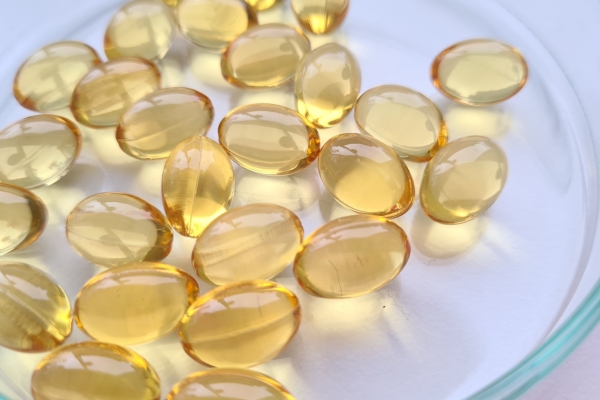Are you unknowingly speeding up your brain’s aging process?
As we get older, the risk of losing sharpness, forgetting names, and feeling mentally sluggish becomes very real.
For most people, it’s easy to chalk this up to “just getting old.”
But what if I told you that there’s a powerful, yet often overlooked nutrient that could be the key to staying sharp well into your golden years?
We’re talking about omega-3 fatty acids—specifically DHA and EPA—the nutrients your brain craves but might not be getting enough of.
The right intake of these healthy fats isn’t just about avoiding cognitive decline; it’s about maintaining clarity, boosting memory, and even enhancing your mood.
But if you’re not taking this seriously, you could be letting age rob you of something much more valuable than just your physical health—your mental edge.
Let’s dive into why omega-3s should be your brain’s new best friend as you get older.

What Are Omega-3 Fatty Acids?
Not all fats are created equal—and some could be the game-changer for your brain.
Omega-3 fatty acids are a type of fat your body absolutely needs but can’t produce on its own. There are three main types you need to know: DHA, EPA, and ALA.
Let’s break it down.
DHA (docosahexaenoic acid) and EPA (eicosapentaenoic acid) are the heavy hitters when it comes to brain health.
These are the omega-3s that come primarily from fatty fish like salmon, mackerel, and sardines.
They’re the ones responsible for keeping your brain cells functioning smoothly, reducing inflammation, and supporting overall cognitive function.
Think of DHA as the structural powerhouse, maintaining the integrity of your brain’s cells, while EPA works as the anti-inflammatory agent, fighting off damage that can lead to cognitive decline.
Then there’s ALA (alpha-linolenic acid)—the plant-based version found in foods like flaxseed, chia seeds, and walnuts.
While it’s still an omega-3, it’s not as efficient for brain health. Your body has to convert ALA into DHA and EPA, but it does so at a frustratingly low rate.
Translation?
If you’re relying only on plant sources for omega-3s, you might be leaving your brain undernourished.
Bottom line: For top-tier brain health, you need to prioritize DHA and EPA.
They’re not just beneficial—they’re essential. If you want your brain to keep firing on all cylinders as you age, loading up on these omega-3s is non-negotiable.

The Link Between Omega-3 Deficiency and Cognitive Decline
If you’re not getting enough omega-3s, you’re setting yourself up for serious brain trouble.
Think of omega-3s as the maintenance crew that keeps your brain running smoothly.
When you fall short on these essential fats, the cracks start to show—and the consequences aren’t pretty.
First off, without sufficient DHA and EPA, your brain’s cell membranes lose that crucial flexibility they need for quick communication.
What does that mean for you? Slower thinking, memory lapses, and that frustrating brain fog that makes even simple tasks feel like a struggle.
But it doesn’t stop there.
A chronic lack of omega-3s is directly linked to cognitive decline, increasing your risk for conditions like dementia and Alzheimer’s disease.
Studies show that people with lower levels of DHA and EPA have smaller brain volumes as they age—yes, your brain literally shrinks faster without these fats.
And when your brain shrinks, memory, focus, and even personality changes can start to take hold.
Omega-3 deficiency also ramps up inflammation in the brain, paving the way for plaques and tangles—the nasty stuff found in the brains of Alzheimer’s patients.
It’s like letting rust build up on a machine until it finally breaks down.

How Omega-3s Support Brain Function
Want to keep your brain firing like a well-oiled machine?
Omega-3s are the secret weapon you can’t afford to ignore.
Let’s get into the science behind why these fatty acids are more than just a supplement trend—they’re essential for keeping your mind sharp.
Cell Membrane Flexibility
First up, cell membrane fluidity. DHA, one of the key omega-3s, is a critical building block of your brain cells.
It keeps the cell membranes flexible, which is crucial for proper communication between neurons.
Think of it like this: if your brain cells were stiff and rigid, signals would be slower, and that “mental fog” you feel could settle in more often.
With the right amount of omega-3s, your brain cells stay fluid and responsive, allowing messages to zip across your brain like lightning. [1]
Anti-Inflammatory Benefits
Next, inflammation control.
Chronic inflammation is one of the biggest threats to your brain as you age.
EPA, the other star omega-3, plays a huge role here. It actively reduces inflammation, protecting your brain from the kind of long-term damage that can lead to cognitive decline, dementia, and even Alzheimer’s disease.
In other words, EPA is like having a shield up, fending off the brain’s worst enemies. [2]
Helps with Neurotransmitters
Lastly, let’s talk about neurotransmitter support.
Omega-3s help maintain the levels of key neurotransmitters like serotonin and dopamine—those feel-good chemicals that keep your mood stable and your brain focused.
A lack of these can lead to more than just a down day; over time, it can spiral into depression and memory issues. [3]

How to Incorporate Omega-3s into a Senior’s Diet
Ready to boost your brain health? It all starts with what’s on your plate—and in your supplement cabinet.
If you’re serious about keeping your mind sharp as you age, you need a consistent intake of omega-3s.
Here’s how to make it happen.
First, let’s talk about omega-3-rich foods. The best sources are fatty fish like salmon, mackerel, and sardines.
Aim to get at least two servings a week, which can easily be added to lunches or dinners.
Not a fan of fish? You can sneak in some omega-3s with plant-based options like flaxseed, chia seeds, and walnuts.
Throw them into your oatmeal, salads, or smoothies. But remember—while plant sources have ALA, your body isn’t great at converting it into the DHA and EPA your brain needs, so don’t rely solely on them.
Now, let’s get real. Most people aren’t eating enough fish to meet their omega-3 needs.
That’s where supplements come in.
If you’re going down the supplement route, here’s what to look for:
DHA and EPA Content: Make sure the supplement has a good balance of both, focusing more on DHA for brain health.
Purity and Quality: Look for supplements that are third-party tested for purity and free from contaminants like mercury and heavy metals.
Dosage: Most experts recommend a daily intake of 1,000-2,000 mg of combined DHA and EPA for brain health. Don’t settle for less.
Consistency is key.
Taking an omega-3 supplement once in a while isn’t going to cut it.
For noticeable brain benefits, you need to make this a daily habit, just like brushing your teeth. It’s not about short-term fixes—it’s about long-term protection. Stick with it, and your brain will thank you down the line.

Prioritizing Brain Health in the Golden Years
Your brain deserves as much attention as your body—especially as you age.
Omega-3 fatty acids are key to keeping your mind sharp, memory strong, and mood balanced.
We’ve discussed how DHA and EPA specifically support brain function and protect against cognitive decline.
Now it’s time to act. Incorporate more omega-3-rich foods into your diet or, for a reliable source, consider a high-quality supplement.
For the right balance of DHA and EPA, check out Critical Nutrition Labs Omega-3 Supplement.
Our formula is designed to give your brain the support it needs for long-term cognitive health.
Don’t wait—take control of your brain health today with our omega-3 supplement here.
References
Journal of the American College of Nutrition
Simopoulos AP. Omega-3 fatty acids in inflammation and autoimmune diseases. J Am Coll Nutr. 2002 Dec;21(6):495-505. doi: 10.1080/07315724.2002.10719248. PMID: 12480795.
CNS & Neurological Disorders - Drug Targets
Healy-Stoffel M, Levant B. N-3 (Omega-3) Fatty Acids: Effects on Brain Dopamine Systems and Potential Role in the Etiology and Treatment of Neuropsychiatric Disorders. CNS Neurol Disord Drug Targets. 2018;17(3):216-232. doi: 10.2174/1871527317666180412153612. PMID: 29651972; PMCID: PMC6563911.

